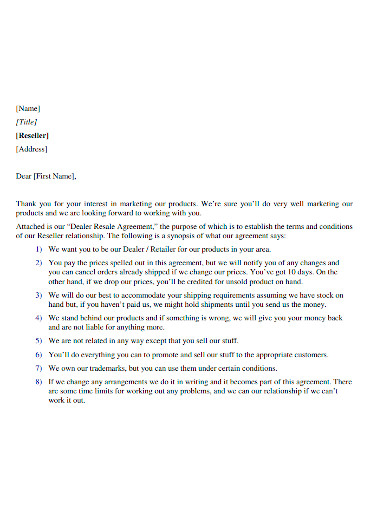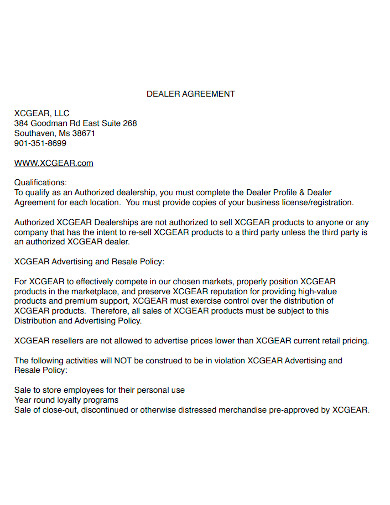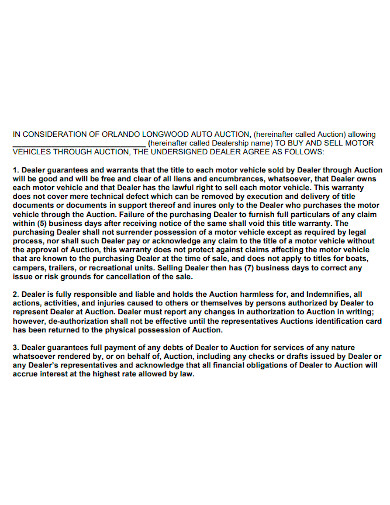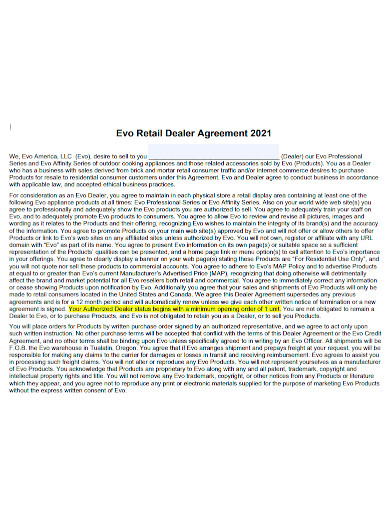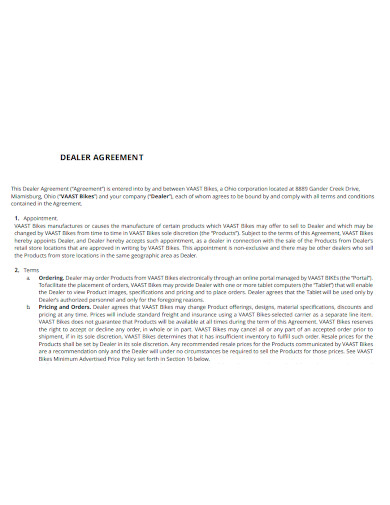Term Purchase and Resale Agreements (PRAs) are for longer periods of time than Special Purchase and Resale Agreements (SPRAs). Term PRAs have traditionally been utilized exclusively during times of market stress, and they are no longer in use. In a repo transaction, two counterparties agree to sell securities to each other while also agreeing to repurchase them at a defined price at a later date. As a result, the securities can effectively be used as collateral for a cash loan. The securities in question are usually fixed-interest instruments, with interest rates used to determine pricing. The repo rate is the accepted interest rate. While numerous market participants participate in such transactions, central banks normally only do so with a few banks in their domestic money markets, on a short-term basis, and in order to implement monetary policy.
4+ Dealer Resale Agreement Samples
It needs planning and strategy to create a successful reseller/resale relationship. The businesses should complement one another in a way that generates income opportunities while also providing compelling reasons to do business together. It should have sound economics and a program structure that includes a diverse range of investments that go beyond transactional margins. Reseller partners with similar characteristics, such as ability, drive, and capacity, are usually good. They should be able to implement the product successfully, have a desire to sell the product or service, and have the capacity, or actual means, to provide it.
1. Dealer Resale Agreement Sample
2. Printable Dealer Resale Agreement
3. Standard Dealer Resale Agreement
4. General Dealer Resale Agreement
5. Vehicle Dealer Resale Agreement
Things to Include
The goods, services, and parties involved will all influence the reseller/resale agreement. Any reseller agreement should have the following sections and information in general:
- Dates of agreement and implementation
- Parties’ names and relationships
- Resellers are appointed.
- Orders for goods
- Purchase orders are accepted, modified, rejected, and cancelled.
- Products are provided, and defective ones are replaced or repaired.
- Products are delivered.
- Marketing materials and regulatory documents are examples of product materials.
- Product delivery are accepted or rejected.
- Acceptance and rejection are two different things.
- Modifications to products or services
- All prices, discounts, and resale prices are subject to change.
- Price fluctuations
- Reseller duties and responsibilities
Pay close attention to payments to avoid any ambiguity or misinterpretation. Make certain you spell out the following:
- Procedures and standards for invoices
- Dates and deadlines for payment
- Taxes
- Interest is charged on late payments.
- Any additional terms
Also, keep the following legal theories and topics in mind:
- Limitations on warranties are mentioned in the text.
- Parties’ assertions, legal rights, and a timeframe for disclosing information
- The management of intellectual property
- No reverse engineering is permitted.
- Grants of licenses
- Verify that all local, state, and federal laws, as well as export control rules, are followed.
- Clause of confidentiality
- Indemnification
- Audit of books and records publicity and inspection
- The consequences of termination
- Liability restrictions
- How is conflict resolution handled?
- Unforeseen circumstances
FAQs
What are the main issues for a reseller?
- Exclusiveness and territory. In most cases, the agreement will designate a geographical area in which the reseller will operate. The contract will also specify whether they have sole and exclusive rights to sell such products in the territory or if they have non-exclusive rights.
- The scope of the product. If your supplier offers a wide range of products, you’ll need to decide if the contract should cover all of them or just a subset of them. You might wish to mention that if you start with a narrow range, it can be expanded.
- Terms of payment and pricing. Obviously, these are crucial, as the distributor want a large profit margin.
- Ordering and delivery services are available. Will the provider fulfill all product orders in a timely manner? Support for the product and marketing. Is the supplier willing to help with marketing and promotion efforts?
What is the history of purchase and resale agreements?
The Bank of Canada first used the term PRAs in December 2007, after Canadian money markets tightened in the midst of global funding problems following the onset of the 2007 financial crisis; a brief determination that the situation had calmed was reversed in March 2008 when funding pressures resurfaced, resulting in Bear Sterns’ collapse. The Bank of Canada permitted PRAs to mature in June and July, only for the collapse of Lehman Brothers and the near-bankruptcy of AIG to reshape the money market in September 2008, prompting the usage of PRAs to help ease conditions once more. In 2010, the final PRA was completed.
If you want to see more samples and formats, check out some dealer resale agreement samples and templates provided in the article for your reference.
Related Posts
FREE 10+ Mentoring Agreement Samples In MS Word | Apple Pages | PDF
FREE 10+ Partner Agreement Samples In MS Word | Google Docs | Apple Pages | PDF
FREE 10+ Individual Agreement Samples In MS Word | Google Docs | Apple Pages | PDF
FREE 10+ Strategic Agreement Samples In MS Word | Google Docs | Apple Pages | PDF
FREE 10+ Equity Agreement Samples In MS Word | Google Docs | Apple Pages | PDF
FREE 10+ Producer Agreement Samples in MS Word | Apple Pages | PDF
FREE 10+ Grant Agreement Samples In MS Word | Apple Pages | PDF
FREE 8+ Meeting Agreement Samples in MS Word | Google Docs | Apple Pages | PDF
FREE 10+ Community Agreement Samples In MS Word | Google Docs | PDF
FREE 8+ Real Estate Option Agreement Samples in MS Word | PDF
FREE 10+ Call Option Agreement Samples In MS Word | PDF
FREE 10+ Advertising Agreement Samples In MS Word | Google Docs | Apple Pages | PDF
FREE 10+ Car Agreement Samples In MS Word | Google Docs | Apple Pages | PDF
FREE 10+ Horse Agreement Samples In MS Word | Apple Pages | PDF
FREE 10+ Option Agreement Samples In MS Word | Google Docs | Apple Pages | PDF

